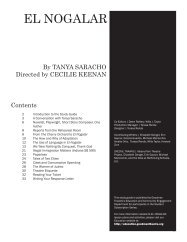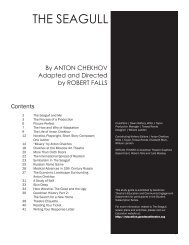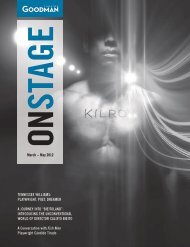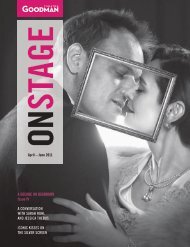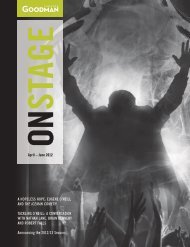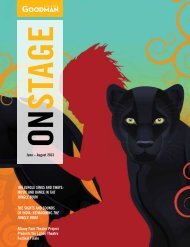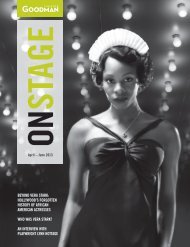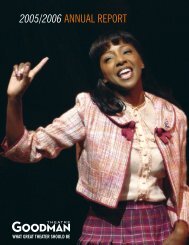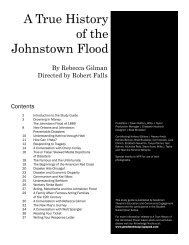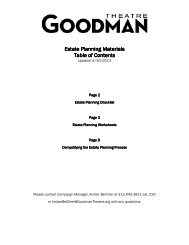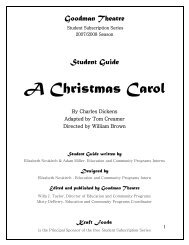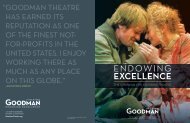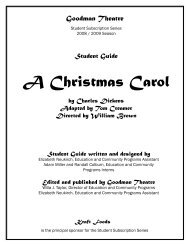Create successful ePaper yourself
Turn your PDF publications into a flip-book with our unique Google optimized e-Paper software.
RIGHT: Dr. Elizabeth<br />
Loftus delivers testimony<br />
on her research in court.<br />
AP Photo/Jodi Hilton.<br />
tion to fill in the gaps—without realizing<br />
they had made changes. Furthermore,<br />
their retellings often omitted aspects of<br />
the tale that were inconsistent with their<br />
own worldviews: for example, if a tale<br />
contained Native American mysticism,<br />
participants (who were raised primarily<br />
in Judeo-Christian Western cultures)<br />
tended to forget those details, and<br />
remember the aspects of the story that<br />
were more familiar, such as the relationships<br />
between family members. Upon<br />
being asked to retell the tale several<br />
times, people increasingly embellished<br />
certain details and left out others with<br />
each repetition. Each participant told<br />
his or her own version of the folktale,<br />
a version shaped both by imperfect<br />
memory and preexisting worldviews.<br />
Since then, numerous studies have bolstered<br />
Bartlett’s findings. Preeminent<br />
psychologist Elizabeth Loftus has conducted<br />
research on memory for more<br />
than 40 years, focusing particularly on<br />
the unreliability of eyewitness testimony.<br />
Memories, she has found, are vulnerable<br />
creatures, subject to suggestion and<br />
outside input that occurs after the event<br />
in question has ended. Loftus showed<br />
study participants an image of a car near<br />
a yield sign, then gave them a written<br />
description of the picture they’d seen.<br />
Some descriptions contained misinformation—they<br />
stated that the car was at a<br />
stop sign. Those participants with faulty<br />
descriptions were likely to state that<br />
the car had indeed been at a stop sign.<br />
While this error had no consequences in<br />
a laboratory setting, in the real world the<br />
consequences can be dire. As a consultant<br />
on hundreds of court cases, Loftus<br />
counsels legal professionals on when and<br />
how to use eyewitness testimony—and<br />
when to discount it.<br />
When a writer pens a memoir, then,<br />
what story is she or he telling?<br />
Psychologist and writer Lauren Slater<br />
tackles the question in her book Lying.<br />
Slater explains, “There is only one kind<br />
of memoir I can see to write, and that’s<br />
a slippery, playful, impish, exasperating<br />
text, shaped, if it could be, like a question<br />
mark.” She writes about suffering<br />
from epilepsy since age 10, enduring frequent<br />
seizures and smelling nonexistent<br />
scents. She describes receiving therapy<br />
from nuns and learning to ice skate. She<br />
recounts, with precise detail, succumbing<br />
to and overcoming her illness. But<br />
Slater explains unapologetically along<br />
the way that we, the readers, shouldn’t<br />
take her too literally. Her truths are<br />
metaphorical: they reflect her subjective<br />
experience, rather than the literal events<br />
of her life. She might, or might not, have<br />
ever had epilepsy at all.<br />
Slater’s evasion of fact is purposeful<br />
and transparent; her purpose is to raise<br />
questions about the nature of truth and<br />
lying. But her lies vary only in degree<br />
from memoirs which purport to be truthful.<br />
In Other Desert Cities, is Brooke’s<br />
viewpoint more truthful than that of her<br />
parents? Is the ice, indeed, thin when a<br />
memoir involves people who are still living,<br />
whose reputations can be tarnished?<br />
And can we, amid the muddle of our<br />
lives and the chaos of our consciousness,<br />
find any truth at all?<br />
Individual Support<br />
for Other Desert Cities<br />
The <strong>Goodman</strong> is proud to acknowledge the following<br />
individuals who support the <strong>Goodman</strong>’s<br />
production of Other Desert Cities.<br />
Marcia S. Cohn<br />
Doris and Howard Conant Family Foundation<br />
Cynthia and Michael R. Scholl<br />
Director’s Society Sponsors<br />
Commitments as of December 10, 2012<br />
American Airlines Sets the Stage for Global<br />
Citizenship<br />
With a relationship spanning 30 years, American Airlines has lent its expertise in “making connections” to<br />
play a vital role in <strong>Goodman</strong> <strong>Theatre</strong>’s productions and programs.<br />
American has provided travel for virtually all of <strong>Goodman</strong> <strong>Theatre</strong>’s performers, as well as its literary and<br />
artistic leadership. This generosity has enabled the <strong>Goodman</strong> to continue its ongoing collaboration with<br />
Havana’s Teatro Buendía and has helped it discover the next generation of theater artists that will light up<br />
the <strong>Goodman</strong>’s stages. American, American Eagle and AmericanConnection operate over 3,500 flights a day<br />
to more than 260 airports in over 50 countries and territories.<br />
This longstanding partnership between these two pillars of the community allows the <strong>Goodman</strong> to shine in<br />
its role as a cultural gem of Chicago and serves as a reminder of the strong commitment that American has<br />
to the communities it serves at home and abroad.<br />
7



